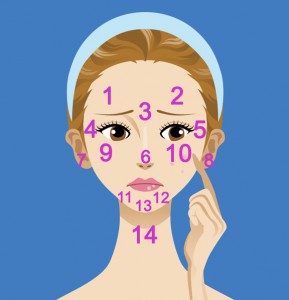Acne
Acne occurs when tiny holes on the surface of the skin, called pores, become clogged.
- Each pore is an opening to a follicle, which contains a hair and an oil gland. These oil glands help lubricate the skin and help rem
 ove old skin cells.
ove old skin cells. - When glands produce too much oil, the pores can become blocked. Dirt, debris, bacteria, and inflammatory cells build up. The blockage is called a plug or comedones.
- The top of the plug may be white (whitehead) or dark (blackhead).
- If the plug breaks open, the material inside causes swelling and red bumps to form.
- If the inflammation is deep in your skin, the pimples may enlarge to form firm, painful cysts.
Acne is a problem of swelling and inflammation, not a problem caused by bacteria.
Acne is most common in teenagers, but it can happen at any age, even in an infant. Three out of four teenagers have some acne. Hormonal changes probably cause increased oil in the skin. However, people in their 30s and 40s may also have acne.
Acne tends to run in families and can be triggered by:
- Hormonal changes related to menstrual periods, pregnancy, birth control pills, or stress
- Greasy or oily cosmetic and hair products
- Certain drugs (such as steroids, testosterone, estrogen, and phenytoin) ( Phenytoin sodium is a commonly used antiepileptic
- High levels of humidity and sweating
Despite the popular belief that chocolate, nuts, and greasy foods cause acne, research does not confirm this idea. Diets high in refined sugars may be related to acne, though.


